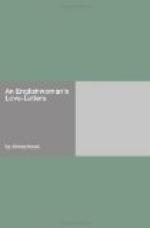My Dearest: See what an effect your “gallous young hound” episode has had on me. I send it back to you roughly done into rhyme. I don’t know whether it will carry; for, outside your telling of it, “Johnnie Kigarrow” is not a name of heroic sound. What touches me as so strangely complete about it is that you should have got that impression and momentary romantic delusion as a child, and now hear, years after, of his disappearing out of life thus fittingly and mysteriously, so that his name will fix its legend to the countryside for many a long day. I would like to go there some day with you, and standing on Twloch Hill imagine all the country round as the burial-place of the strong man on whose knees my beloved used to play when a child.
It must have been soon after this that your brother died: truly, dearest, from now, and strangely, this Johnnie Kigarrow will seem more to me than him; touching a more heroic strain of idea, and stiffening fibers in your nature that brotherhood, as a rule, has no bearing on.
A short letter to-day, Beloved, because what goes with it is so long. This is the first time I have come before your eyes as anything but a letter-writer, and I am doubtful whether you will care to have so much all about yourself. Yet for that very reason think how much I loved doing it! I am jealous of those days before I knew you, and want to have all their wild-honey flavor for myself. Do remember more, and tell me! Dearest heart, it was to me you were coming through all your scampers and ramblings; no wonder, with that unknown good running parallel, that my childhood was a happy one. May long life bless you, Beloved!
(Inclosure.)
My brother and I were down
in Wales,
And listened by night to the
Welshman’s tales;
He was eleven and I was ten.
We sat on the knees of the
farmer’s men
After the whole day’s
work was done:
And I was friends with the
farmer’s son.
His hands were rough as his
arms were strong,
His mouth was merry and loud
for song;
Each night when set by the
ingle-wall
He was the merriest man of
them all.
I would catch at his beard
and say
All the things I had done
in the day—
Tumbled bowlders over the
force,
Swum in the river and fired
the gorse—
“Half the side of the
hill!” quoth I:—
“Ah!” cried he,
“and didn’t you die?”
“Chut!” said he,
“but the squeak was narrow!
Didn’t you meet with
Johnnie Kigarrow?”
“No!” said I,
“and who will he be?
And what will be Johnnie Kigarrow
to me?”
The farmer’s son said
under his breath,
“Johnnie Kigarrow may
be your death
Listen you here, and keep
you still—
Johnnie Kigarrow bides under
the hill;
Twloch barrow stands over
his head;
He shallows the river to make
his bed;
Bowlders roll when he stirs
a limb;




